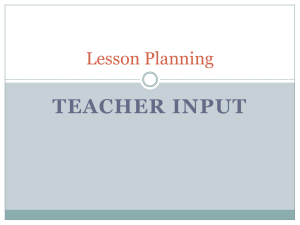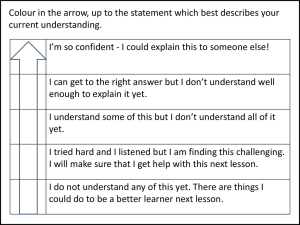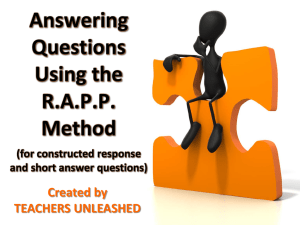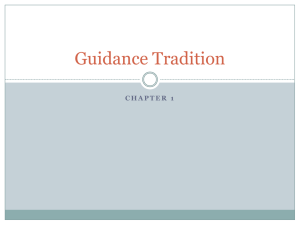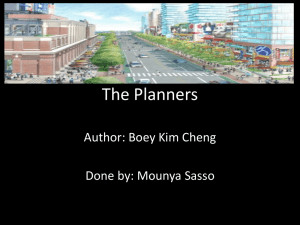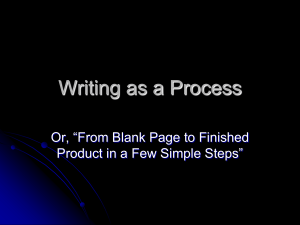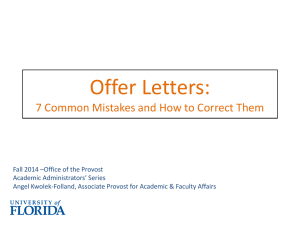Peer editing: A good idea?
advertisement
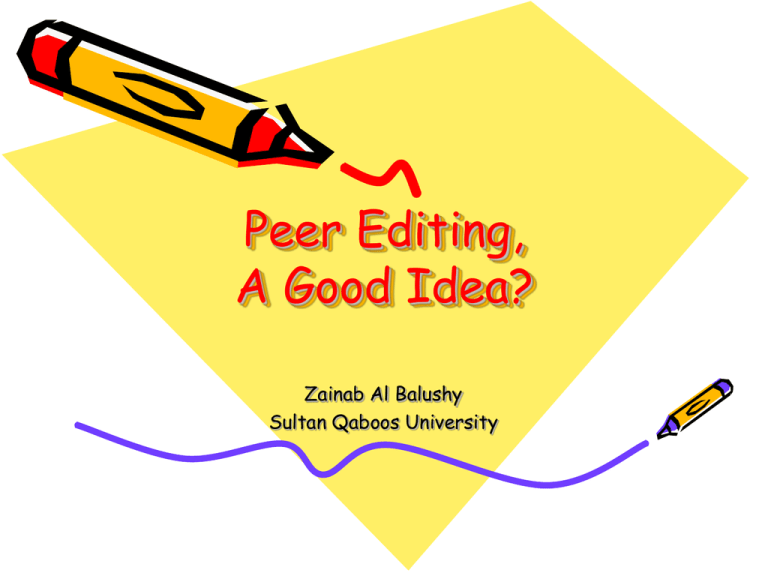
Peer Editing, A Good Idea? Zainab Al Balushy Sultan Qaboos University What is peer editing? • The process through which students respond to and offer feedback on their peers' writing, • The peer editor does not correct the paper's mistakes, highlights positives and negatives, • The peer editor assists the writer fix their own mistakes , • It is easier to notice another person's mistakes • It does not replace or underestimate the teacher’s evaluation Areas of suggestion • • • • • Title Thesis statement Transitions Punctuation Use of statistics, anecdotes, facts, or examples • Word choice • Connectors • Singulars/plurals Areas of suggestion • • • • • • • • • • Unity Main ideas verb-agreement Topic sentences Supporting Details Sentence Structure Paragraphing spelling mistakes Articles Attractive conclusion Correction Symbols Cap = Capitalization WF = wrong Form P = Punctuation SP = Spelling VT = verb Tense WW = Wrong Word Agr = Agreement PL= Plurals / = Not necessary ^ = Add a word ? = Unclear * = Other problem or concern Peer Editing Steps 1) 2) 3) 4) 5) Arrange the peers. Students swap over papers Use the feedback sheets you provided Put their own names on the papers Give them time to read through the essays Peer Editing Steps 6) Students get their papers. 7) They correct their mistakes. 8) Check with the editor for clarification. 9) Negotiate their mistakes with the editor 10) Use dictionaries and class notes Research Instrument • Students’ questionnaire • 100 • Teachers’ questionnaire • 30 Findings • • • • • Teachers 1) Do you use peer editing with your students? a) Yes 25 b) Why? It gives students a chance to practice their skills, discuss problems in context and check grammar. • It shows them what other students are doing. • Good for weak students if paired with strong ones Findings • It helps students be more cautious of what they learn. • It fosters autonomous learning • It helps establish good rapport among students • It raises awareness of students’ own work • Team work cooperation • They share ideas • It gives them the chance to proofread Findings • By looking at other students’ errors, they realize that their own work also needs attention • It helps them to notice ambiguity • It allows for painless spelling check • Differences in students’ opinions may lead to better learning • Students feel happy doing it • It is a requirement in the program Findings • • • • • • It encourages students to work in pairs It helps them to focus on target language items. It creates a relaxed learning environment It raises students’ awareness as readers It re-assesses and re-formulates students work Students give each other tips on how to improve their writing. • It develops critical thinking skills Findings • • • • • • • • They find it interesting It is exciting for students Students learn from others’ mistakes It can save class time It encourages students’ ability to spot errors It is easier to find others’ mistakes It provides students a sense of audience It helps them be more focused Findings • • • • • • • c) No 15 d) Why not? Most students are not able to do it well It is mainly the teachers’ responsibility Many students make wrong corrections It could sometimes be too boring, too slow It requires too much teacher modeling Findings • • • • • It is the blind leading the blind. It wastes time It wasn’t very successful when I tried it. Only a minority of students seamed to tale to it If students’ level is very low, they wouldn’t be able to do it. Findings • • • • 2) Do you count on students’ editing? a) Yes 10 b) Why? At times, students can see and explain things in a better way than the teacher • The teacher will not always be there • It helps teachers’ identify students’ problems Findings • It shows the teachers if the students are serious and accountable • It tells the teacher how much the student editor knows • There is always background knowledge that the other students may lack • It helps teachers prepare for future language/grammar points Findings • • • • • • c) No 20 d) Why not? We do not have enough time to do it The students are not perfect in English It is unreliable Students are happier with a teacher-fronted class Findings • 3) What do you think students learn from each others' peer editing? • How to plan a writing piece • Various structure types • New vocabulary • Correct spelling • New ideas • It helps them not to do the same mistakes themselves Findings • • • • They get an idea of the common errors Exposure to organization skills They share their general knowledge Some students accept their peers’ ideas for change • It shows them how easy it is to make errors • It tells them that they must think before they write • They learn that translations from Arabic do not work all the time Findings • • • • • • • They rehearse what they already learnt It shows them the effects of cooperation They get to know the good students in class It allows for competition between students They pay attention to their content They hear themselves on paper They review the classroom discussion and the textbook together • It is reflective/reflexive Findings • • • • 4) How often do you apply peer editing? a) Once per semester 5 b) Once per assignment 20 c) Never 5 Findings • 5) Do you give students the freedom to choose their editing peers? • a) Yes 12 • b) Why? • They need to feel comfortable with whom they work • It is easier if they pair up with their neighbor Findings • They feel less embarrassed if their mistakes are spotted by their friends • They are more likely to provide honest feedback • It allows for more flexibility • More peer-communication involved Findings • c) No 18 • d) Why not? • Gender separation hurts grouping strong students with weak ones • They need to look at a variety of styles • Weak students may not find any mistakes on strong students’ papers • Students may choose an editor of the same level Findings • • • • • • • • Students 1) Do you like to peer edit? a) Yes 85 b) Why? It helps me recognize my mistakes I avoid those mistakes the next time To share ideas with my partner I can not notice my own mistakes Findings • Students feel confident when they check each others’ mistakes • Students can see their level in writing and how much they know in grammar • It makes us feel like we are teachers • It prepares us for higher levels • It provides chances for communication with peers • We get an experience in editing Findings • • • • • • • • I remember my mistakes I get help to fix my mistakes We get more ideas about the topic We encounter various thinking ways We become more sociable We learn new information I like it when someone tells me my mistakes It builds strong relationships Findings • It allows us to correct our mistakes before the teacher sees them • It helps me improve my writing, reading, vocabulary, grammar and spelling • We get to know the differences between each other • It makes me try to improve • It creates competition between us • We exchange information Findings • • • • • • • • We learn the things we should focus on We know others’ mistakes It helps us to edit our writing in exams It helps us to get good marks It helps the writers know their weaknesses It feels good to help others We get to know the formal criteria for writing It helps me submit a better essay to my teacher Findings • • • • It helps us to think about sentence structures I will learn how to find my own mistakes We are the same age, we feel comfortable I trust that my friend will find my mistakes and help me correct them • We learn new information Findings • • • • • c) No 15 d) Why not? I don’t like other students to know my mistakes The correction could be wrong The teacher will not know my exact level in writing and hence will not help me • Students sometimes have the same mistakes • It is better done by the teacher • We are all in the same level Findings • It sometimes makes me confused • It takes a long time • They sometimes mark new words as mistakes just because they are new to them • It makes you feel board • Students have the same mind, so they can not notice mistakes • Some students feel shy and embarassed • It is a hard work Findings • My partner does not have a lot of experience • I don’t trust other students • I sometimes know more than my partner, so I do not benefit • I do not want people to copy my way of writing • Sometimes the editor makes you change an idea that you like • They do not find all my mistakes Findings • • • • • • • 2) Do you trust the editor? a) Yes 80 b) Why? I know that he can help me We like each other I know that his level is higher than mine They are responsible to find the mistakes so they will do their best Findings • • • • • I choose my editor, so I know his skills He is my friend Because he will also benefit He will find my mistakes to challenge me I know he will be honest Findings • • • • • • • • c) No 20 d) Why not? They make a lot of mistakes They do not know how to check my work I know that my writing is correct Sometimes they will pretend mistakes They are students like us Sometimes editors do not want someone to be better than they are Findings • They can make mistakes in my writing if they are at a lower level than mine • Maybe he does not like me • They have a different way of thinking • They do not understand what I mean • They are students not teachers • They do not care about my writing • They feel reluctant to tell me my mistakes • They think I will not like them any more Findings • • • • • • • • 3) What do you learn from peer editing? Different kinds of mistakes New vocabulary items Some grammar rules Correct way of writing Be careful not to make a lot of mistakes Our spelling weak points Working with others Findings • • • • • • • How to find our mistakes The correct spelling The correct grammar rules Short forms of some words and phrases Dealing with mistakes How to write without mistakes Respecting others’ opinions Findings • • • • • • • • Checking our mistakes in a grammar book Correct use of dictionary Focusing while writing Not doing the same mistakes again To study hard and be quiet in class Learning from my partner's mistakes The skill of editing cooperation Findings • • • • • • • • Using paraphrasing How to organize our essays To figure out our weaknesses in writing Learning responsibility No one is perfect How the teacher corrects our mistakes Not being shy when others find our mistakes Sharing our ideas Findings • • • • • • • • How to write good essays Making new friends Confidence New information People’s opinions about my work Producing a lot in a short time Not to trust everyone’s opinions New sentence structures Findings • • • • • Respecting each other Making good discussions How to manage our time To pay more attention when I write Synonyms and antonyms and different versions of words • Finding my own mistakes by myself the next time Findings • • • • • Reasons behind our mistakes The different kinds of mistakes students make How to work in a group How easy it is to make mistakes Being honest to people Findings • • • • 4) How often do you want to do it? a) Once per assignment 66 b) Once per semester 27 c) Never 7 Findings • • • • • • • 5) Would you prefer to choose your editor? a) Yes 74 b) Why? I choose someone I know their level I know the good editors in the class They have good writing skills I will choose a higher level editor than my level Findings • I learn more things from the good editor • I will choose a person I trust will tell me my mistakes • I will choose the one who will help me get good marks for my writing • I will choose someone I know and understand • I will choose one who knows my skills • I will choose an optimistic editor Findings • • • • • I will choose an honest and serious editor I will choose someone who likes me Because he will improve my work My best friend will help me more than others A good editor will influence me to be a good writer • Not every body knows how to edit • Some editors are better than others Findings • • • • c) No 26 d) Why not? Some students are not confident enough Some students do not want any one to be as good as they are or better than them • Choosing the person makes me very nervous about my mistakes • I do not want the same editor all the time • You learn a lot of things from different editors Findings • It is better to be in different experiences • It does not matter with me • It is better not to know the editor until they finish the editing • You might choose someone to cover your mistakes and not tell you about them Findings • The student who does not know me will help me more • We are all the same level and we make the same mistakes • It could hurt other students’ feelings if I do not choose them • To maintain the trust and the positive feelings among the classmates Findings • • • • Any student can see my mistakes Because all the students are my friends I do not know the level of my classmates He might be nice to me because I chose him and feel shy to show me my mistakes • The assignment will be marked by the teacher at the end Conclusion • The size of the student editing peers • Whether you will choose the students peers or let them self-select • Whether students will work with the same peer every time or change for each assignment. • The tools you give your students, whether written or oral (feedback form). • Make students aware of the steps and benefits of the whole process. Discussion
